Stellantis, the multinational automotive company, has big plans to introduce a $25,000 all-electric Jeep vehicle in the U.S. market in the near future. This move is aimed at appealing to a wider range of mainstream consumers as the adoption of electric vehicles has been slower than expected. The CEO, Carlos Tavares, mentioned during a recent investor conference that the upcoming electric Jeep will be priced similarly to Stellantis’ Citroen e-C3 SUV in Europe. This strategic pricing approach is part of Stellantis’ effort to leverage its global presence and engineering expertise across different regions.
The introduction of a $25,000 electric Jeep by Stellantis aligns with the broader industry trend towards offering more affordable electric vehicles to the masses. Companies like Stellantis, Tesla, and others have been eyeing this price point as a key target to drive higher adoption rates for electric vehicles. This is especially important in light of the success of Chinese automakers like BYD and Nio in the global EV market with their competitively priced models. Carlos Tavares emphasized the need for a safe, clean, and affordable electric vehicle in the U.S., with a target price of $25,000.
Jeep, a brand under the Stellantis umbrella, is making significant strides in electrifying its vehicle lineup. The company’s first all-electric vehicle for the U.S. market is expected to be the Wagoneer S SUV, set to debut later this year. Additionally, a Jeep Wrangler-inspired off-road vehicle named the Recon is also in the pipeline for a potential launch this year. By expanding its electric vehicle offerings, Jeep aims to stay competitive in an evolving automotive landscape that is increasingly focused on sustainability and innovation.
One of the key challenges for automakers like Stellantis is achieving cost parity between their all-electric vehicles and traditional internal combustion engine vehicles. Carlos Tavares indicated that the company is working towards reaching this goal within the next three years to better compete with the influx of affordable EVs from Chinese manufacturers. He acknowledged the current industry dynamics, including the transition to electric vehicles, geopolitical tensions, and the potential consolidation of the automotive sector, as factors contributing to a challenging and chaotic environment.
The geopolitical landscape, particularly in relation to China-made electric vehicles, presents additional hurdles for automakers. Concerns about the impact of less expensive Chinese models flooding global markets and undercutting domestic EV production have been raised within the industry. Tariffs imposed on Chinese EV imports, such as the recent 100% tariff announced by the Biden administration, aim to address these concerns but may have limited effectiveness in curbing competition. Carlos Tavares emphasized the importance of competitiveness and warned against protectionist measures that could hinder future growth and innovation in the automotive sector.
The introduction of a $25,000 all-electric Jeep by Stellantis reflects a broader industry trend towards affordability and sustainability in electric vehicles. While challenges related to cost parity, geopolitical tensions, and market competition persist, companies like Stellantis are pushing forward with their electrification strategies to meet evolving consumer demands and regulatory requirements. The future of all-electric vehicles in the U.S. hinges on the ability of automakers to navigate these complex dynamics and deliver innovative, cost-effective solutions to consumers.

